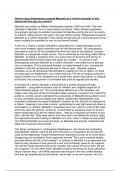How far does Shakespeare present Macbeth as a violent character in this
extract and the play as a whole?
Macbeth was written by William Shakespeare between 1603 and 1606. The main
character is Macbeth, he is a brave warrior and thane. When witches prophesise,
he’s going to be king, his ambition becomes his fatal flaw and by the end, he resorts
to violence, killing anyone who gets in his way without caring. Shakespeare presents
Macbeth as a violent character in this extract and the play as a whole because of the
many murders he committed to only try and benefit himself.
In this Act 1 Scene 2 extract, Macbeth is presented as a violent character by the
vivid visual imagery used to describe how he kills Macdonwald. By using graphic
descriptions such as ‘till he unseamed him from the navel to his jawbone’, portrays
Macbeth as a physically violent warrior. This is reinforced by him being called ‘Brave
Macbeth’, as being a Jacobean man, you were meant to be brave and strong. It
demonstrates that he holds power and status as a soldier – as well as a man.
Shakespeare presents Macbeth as a violent character in the extract as he portrays
him as merciless. This is portrayed through ‘nor bade farewell to him’, showing the
swiftness of the kill, as Macdonwald has no time to react. Macbeth appears
heartless, as he de-humanises Macdonwald by making him into an object, by ‘fixed
his head upon our battlements’, as a violent warning. The act of hanging someone’s
head is shallow, as in the Jacobean era it would have shown King James I’s subjects
at the time, the consequence of unchristian acts such as regicide and murder.
In the play as a whole, Macbeth is presented as a violent character through
symbolism – using biblical phrases such as ‘devilish’ and ‘brightest angel fell’ to
make Macbeth appear evil. This is particularly effective as in the Jacobean era,
religion was a big part of life and therefore taken seriously. It would in turn impact the
audience, as they would understand the seriousness of Macbeth being called a devil,
as they worshiped God and Satan was feared. Additionally, Shakespeare uses
animalistic symbolism to present Macbeth’s violence as evil. Duncan is portrayed as
a Falcon, ‘towering in her pride of place’, symbolising he was high above all others in
his kingship. In contrast, Macbeth is presented as an owl, which is a bird of the night
and hunts upon the ground, not the air. It would feed by swooping down on its prey
before flying high up to kill the mighty falcon - ‘Was by a mousing owl hawk'd at and
kill'd’, with the owl’. Owls were said to trick other bird’s into falling into hunters’ traps;
this represents Duncan trusting in Macbeth too much, when in reality he was tricked
into thinking Macbeth was loyal and good, as Macbeth was actually underhand and
killed him to become King himself.
This binary comparison is continued by Shakespeare, who shows the contrasting
way Macbeth violently ruled (at the end of the play), in comparison to how Duncan
ruled (at the beginning). People honoured and respected Duncan as he is the blood
lineage king and considered God's appointed servant "The Lord's anointed temple,
and stole thence the life o' the building!". In contrary to Macbeth, he is respected and
liked as king, because of how good he is and how he fatherly cares for his subjects,
"So well thy words become thee as thy wounds; they smack of honour both. Go get
him surgeons." On the other hand, Macbeth comes to the throne by force, killing the
king to become king – and killing anybody else that got in the way (unlike Banquo
who also got prophesised by the witches, yet let fate run its own course). He is so




